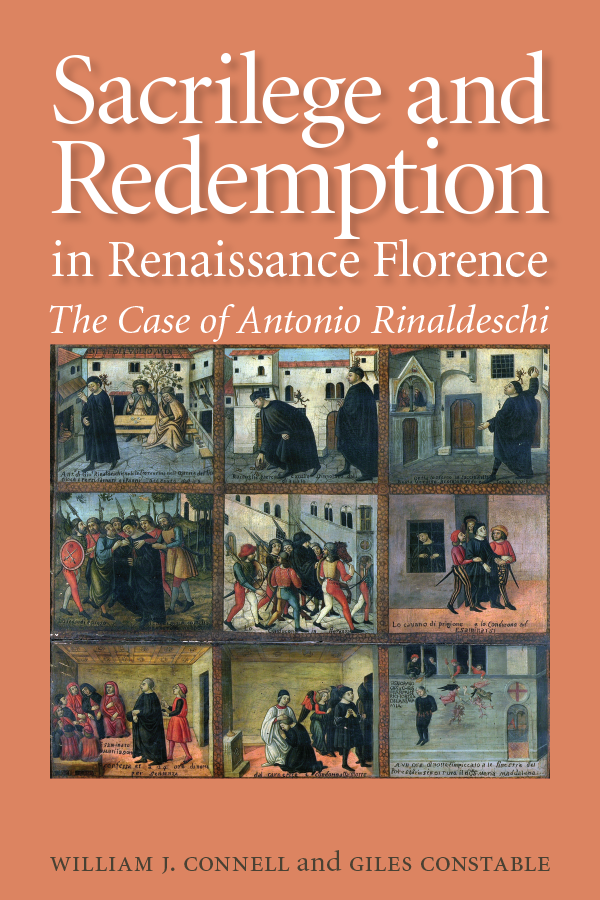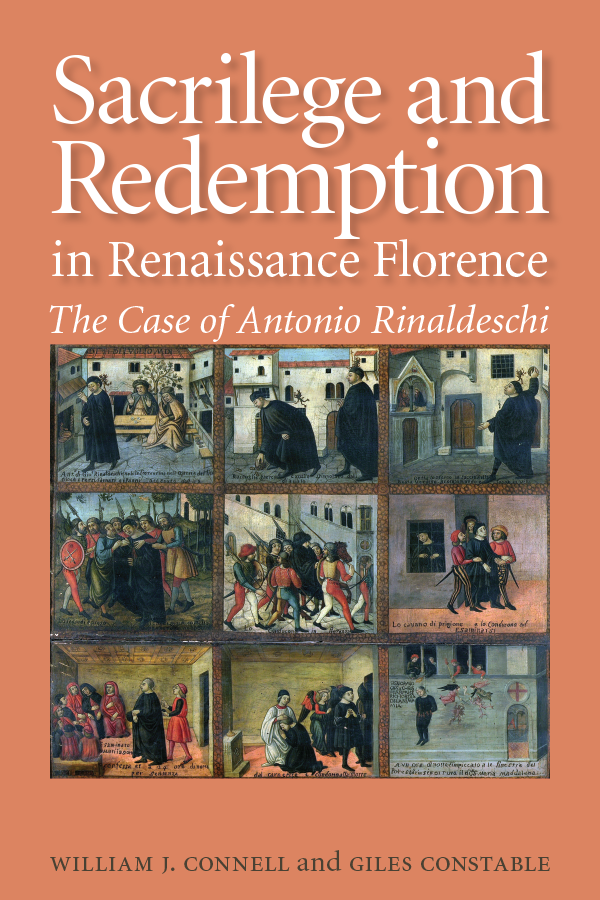Sacrilege and Redemption in Renaissance Florence: The Case of Antonio Rinaldeschi
Edited by William J. Connell and Giles Constable - ES08
Overview
In Florence, in the summer of 1501, a man named Antonio Rinaldeschi was arrested and hanged after throwing horse dung at an outdoor painting of the Virgin Mary. His punishment was severe, even for the times, and the crimes with which he was formally charged — gambling, blasphemy and attempted suicide — did not normally warrant the death penalty.
Sacrilege and Redemption in Renaissance Florence unveils a series of newly discovered sources concerning this striking episode. The authors show how the political and religious context of Renaissance Florence resulted both in Rinaldeschi’s death sentence and in the creation by Savonarola’s followers of a new religious devotion in the heart of the city commemorating the event.
William J. Connell, professor of history, holds the Joseph M. and Geraldine C. La Motta Chair in Italian Studies and directs the Charles and Joan Alberto Italian Studies Institute at Seton Hall University. His books include La citta’ dei crucci: fazioni e clientele in uno stato repubblicano del ‘400 and a new translation of Machiavelli’s Prince.
Giles Constable is retired professor of history at the Institute for Advanced Study and former H. C. Lea Professor of Medieval History at Harvard University and director of Dumbarton Oaks in Washington D.C. He has written and edited about twenty books and upward of eighty articles.
Second, Revised Edition.
137 pp.
ISBN: 978-0-7727-2040-5 softcover
Published: 2012
Contents
List of Illustrations
Archival Abbreviations
Foreword
A Note on Chronology
A Note on Currency
Chapter One: The Culprit and His Offences
Chapter Two: The Nature of the Offence (35-50)
Chapter Three: The Context of Florentine History (51-72)
Illustrations
Appendix of Documents
I. The Sentence of the Eight for Security against Antonio Rinaldeschi [Latin and English] (101-103)
II. “Narration of the Crime of Rinaldesco,” from the account book of the opera of the Madonna de’ Ricci [Italian and English] (104-106)
III. A Notice from the Records Kept by the Company of the Blacks [Italian and English] (107)
IV. A Second Notice from the Records Kept by the Company of the Blacks [Italian and English] (108-109)
V. Appendix V: From the Diary of Luca Landucci [Italian and English] (110)
VI. From a seventeenth-century miscellany compiled by Carlo Strozzi [Italian and English] (111-112)
VII. A Record Copied from a priorista that Belonged to Mateo Segaloni in 1630 [Italian and English] (113-114)
VIII. Payments to the painter Filippo Dolciati in the Account Book of the opera of the Madonna de’ Ricci.[Italian and English] (115-116)
IX. The Decision of the opera to Hire the Architect Baccio d’Agnolo to Build a New Oratory for the Madonna de’ Ricci [Italian and English] (117-119)
Reviews
The Journal of Modern History, 80:3 (September 2008), pp. 683-684. Reviewed by James R. Banker.
The Sixteenth Century Journal, 39:1 (Spring 2008), pp. 201-202. Reviewed by Stefano Dall’Aglio. (Hard copy available at CRRS.)
The English Historical Review, 22:496 (April 2007), pp. 535-536. Reviewed by George Holmes.
Renaissance Quarterly, 59:3 (Fall 2006), pp. 853-854. Reviewed by Thomas Kuehn.
Times Literary Supplement, 5373 (March 24, 2006), p. 36. Reviewed by Alastair Sooke.
Couldn't load pickup availability


